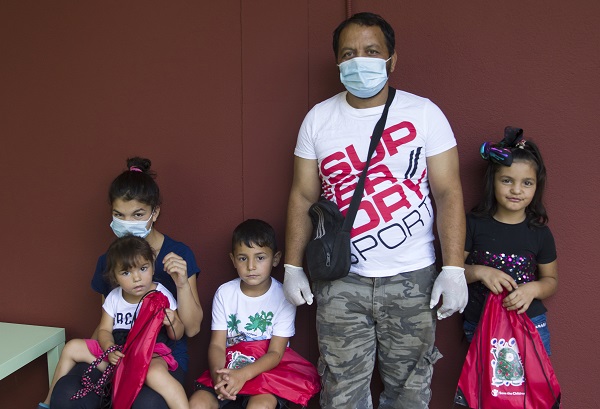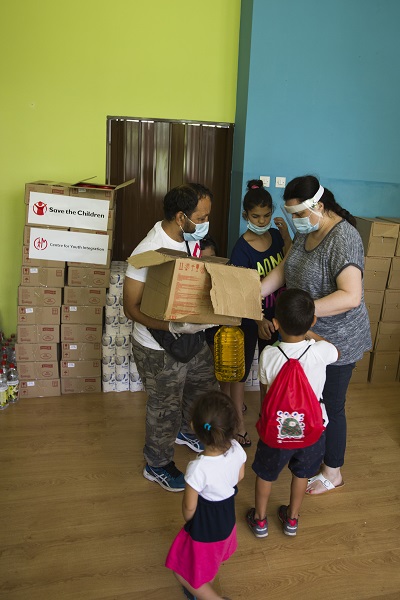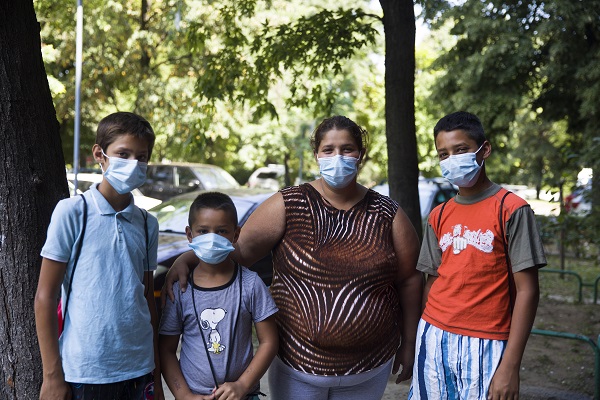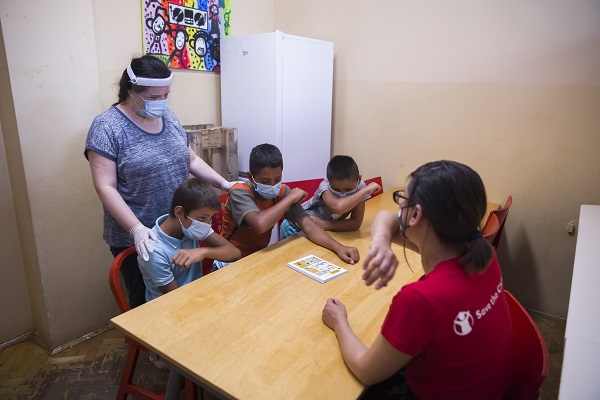 North West Balkans
North West Balkans
Languages
“The coronavirus crisis struck us severely and the support means a lot to us”

Alen* with his children in the drop in centre in Belgrade. Photo: Nemanja Radovanovic, Save the Children
“We spent two months in a coronavirus lock-down, as most of the people in Serbia did” said 40-years-old Alen*, who has been raising his five children as a single parent since he lost his wife two-and-a-half years ago. “This period was very difficult for us as I couldn’t go out to get a job and bring food to the table.”
“We could see that our father was often worried”, says Selena*, his 11-years-old daughter. “We couldn’t go to school and we stayed at home all the time. It was stressful.”
Alen* is not permanently employed, and he supports his family by working as a physical labourer, taking temporary, mostly daily assignments. Without any savings or other resources, his family, and many other families in a similar position, are more vulnerable to the effects of the lock-down that was introduced in Serbia due to the coronavirus outbreak in mid-March and lifted in early May, as well as to all other consequences of the coronavirus crisis. Less jobs are available and many of the support services, which had to be suspended during the lock-down, are still not available in the same capacity.
“The situation hasn’t stabilized yet” said Alen*, “the jobs are hard to find, and we still struggle to provide even the basics, the food and the hygiene products, for our families. The coronavirus crisis struck us severely and the support, such is the aid you provided, means a lot to us”, said the father.

Delivering aid to Alan's family in Belgrade. Photo: Nemanja Radovanovic, Save the Children
With over 28,000 cases and over 650 deaths registered from March until the beginning of August, Serbia is one of the European countries hardest hit by the coronavirus epidemic. The aid provided by Save the Children and partnering organization, Centre for Youth Integration, is a part of a COVID-19 crisis response intervention targeting 400 children from 150 vulnerable families. These families are supported by Centre for Youth Integration through their drop-in centres for those working or living on the street or living in informal settlements in Serbian capital Belgrade, most often Roma children and their families. These families are facing extreme poverty even in regular circumstances. Informal settlements frequently have no electricity or running water, while the families rely on social welfare, temporary jobs or collecting secondary materials to survive.
In the two drop-in centres children find safe place where they can shower and have a meal, as well as psychosocial support and educational support, but these services had to be suspended during the COVID-19 lock-down, which additionally worsened the situation for children. The aid provided by Save the Children, food and hygienic products packages, including diapers and other necessities for families with babies, aims to help families struggling to make ends meet and facing food insecurity as a consequence of the coronavirus crisis. The aid packages also include a notebook with children-friendly information on coronavirus, and tips for online safety to help children to be aware of the risks in the situation when they spend more time on the internet than ever.
The crisis also brought big challenges to Silvana*, a 29-year-old mother, whose husband worked abroad and had difficulties to return home to his family due to the closing of the borders. “In the beginning I was alone with my nine children, who couldn’t go to school, couldn’t come to the drop-in centre, and had to continue learning from home”, said Silvana*. As her youngest child is only 10 months old, it was impossible for her to make sure that older children are attending classes and doing their homework. “The team from the drop-in centre helped my children to learn, by talking to them every day on the phone and the internet. They also talked to me a lot. My husband eventually managed to return, but now he’s out of work. The diapers and other aid will help us in this difficult period”, said Silvana*.

Silvana* with her sons in front of the drop in centre in Belgrade. Photo: Nemanja Radovanovic, Save the Children
Silvana’s sons, Irfan* (13), Safet* (11) and Amir* (9) said that they can hardly wait for the coronavirus epidemic to be over so they can continue with their normal lives. “Coronavirus is dangerous because it spreads from person to person”, explained Amir*, “and that’s why we’re staying at home, wear masks outside and make sure to keep our hands clean”. “But we need to go to school so we can get a job when we grow up and have life of our own”, said Safet*, and added: “In school, the teacher is there to explain and help us. I hope that we’ll be able to go back to school soon.”

Reading and talking about coronavirus prevention measures with Irfan*, Safet* and Amir*. Photo: Nemanja Radovanovic, Save the Children
In the framework of the response to the coronavirus crisis, Save the Children also supported the Commissariat for Refugees and Migration, the governmental body with mandate to provide accommodation and care for refugees and migrants in Serbia, with 29,000 EUR worth in-kind donation. Centres for refugees and migrants will be equipped with disinfection products, cleaning equipment and other key items for ensuring better protection from the spread of coronavirus and items for improving the accommodation capacities for children and adults who could be staying in Serbia for a longer period due to the closed borders. The donation also includes clothes, footwear, diapers and other NFI’s needed for children and families who arrive in Serbia daily, exhausted, with very little private possessions and in a great need.
*Names are changed in order to protect children’s identity